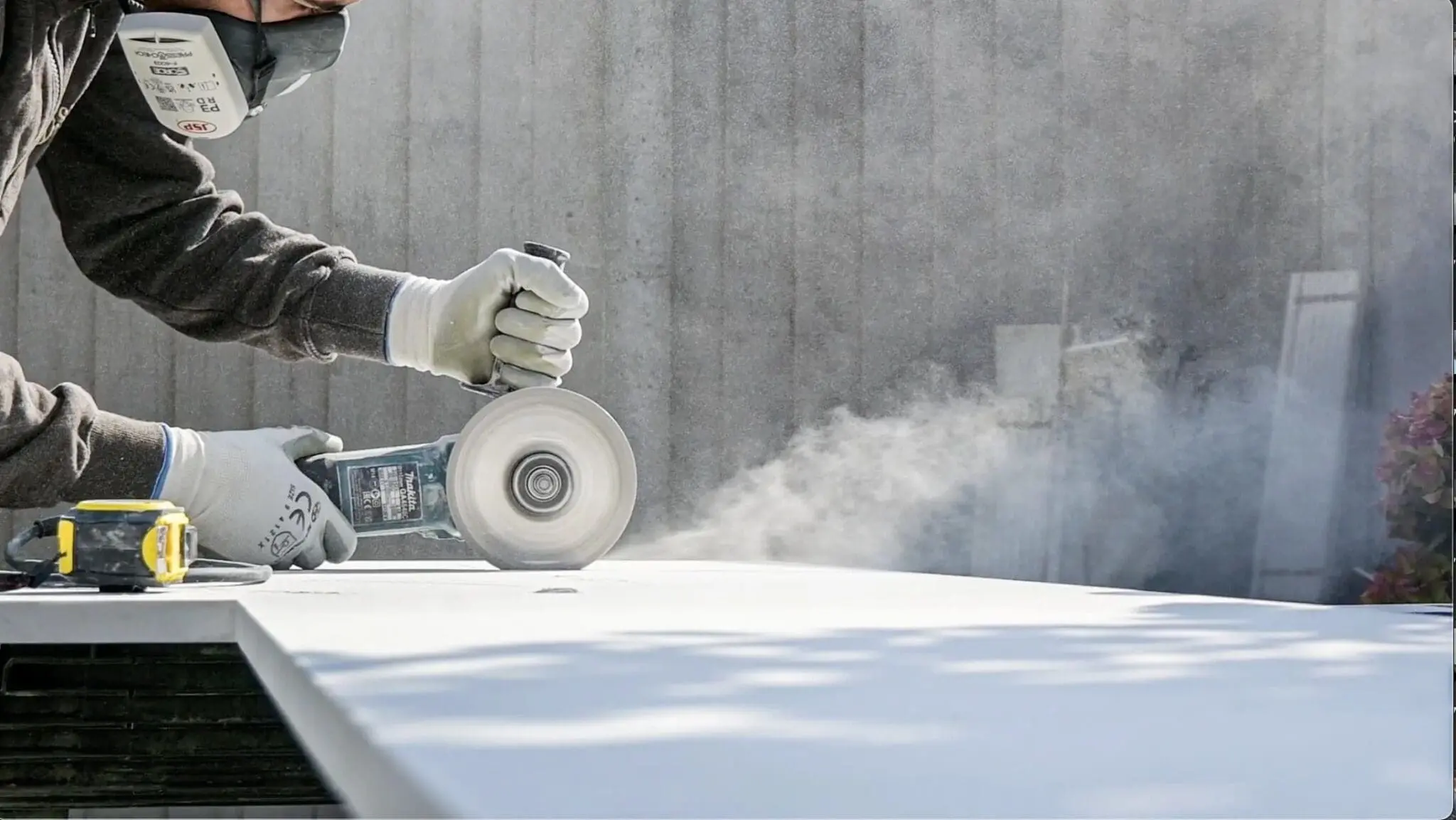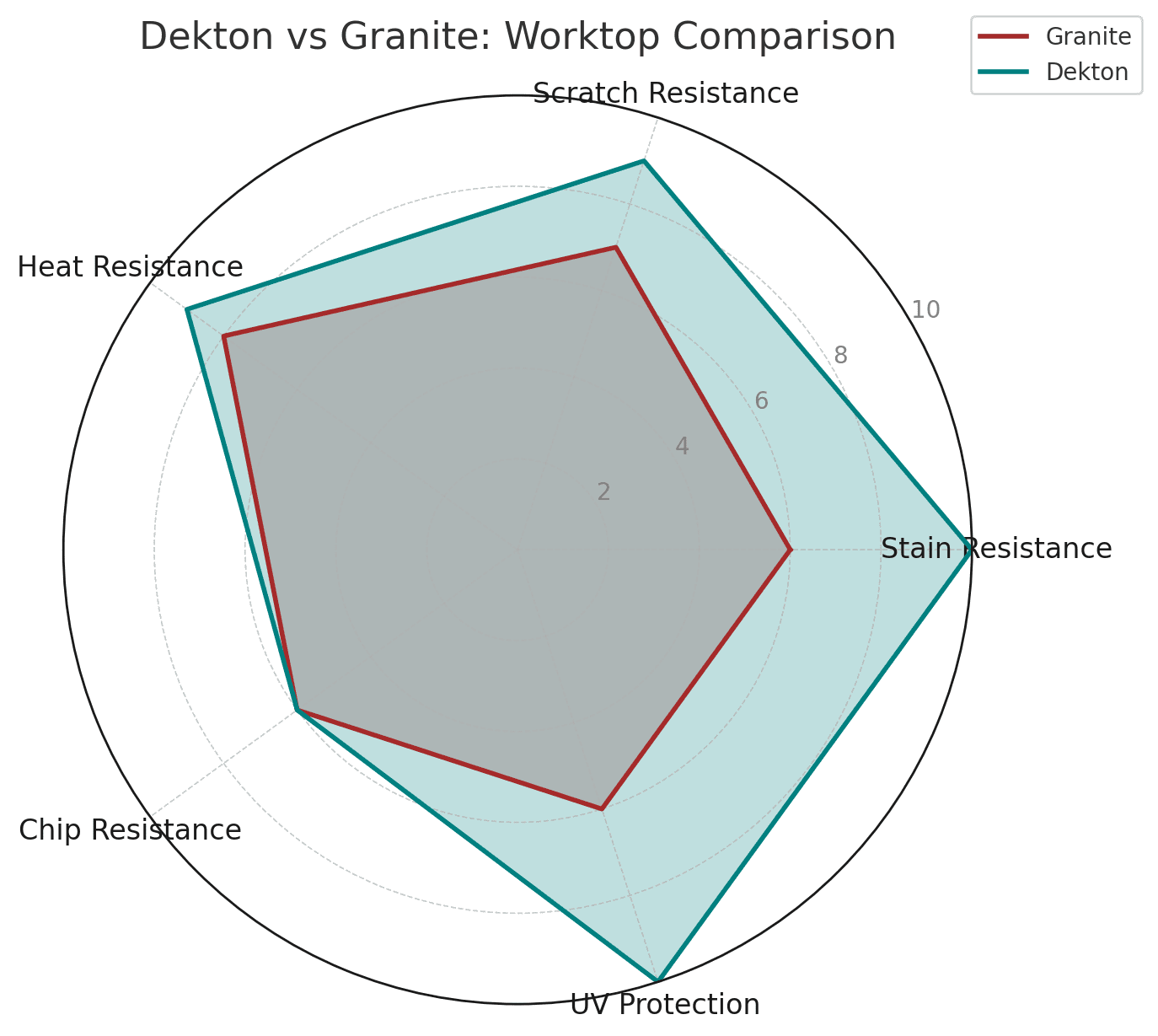
Dekton vs Granite: Which Fits Your Kitchen Best?
If you’ve ever planned a new kitchen, you’ll know the worktop isn’t just “another surface.” It’s the place where you chop vegetables, roll out pastry, drop spoons, spill wine, and rest hot pans after forgetting a trivet. In other words: it’s the battlefield of daily life. Which is why choosing between granite worktops and dekton worktops feels like a much bigger decision than most homeowners expect.
Granite has the romance of being natural stone – millions of years in the making. Dekton, meanwhile, is a newer engineered material that promises almost indestructible performance. Both are strong contenders, but which really suits your lifestyle? Let’s break it down without jargon and see where each shines.

Granite: The Old Master
There’s something undeniably appealing about granite. You’re not buying something made in a factory; you’re buying a literal slice of Earth’s history. It’s quarried in huge blocks, sliced into slabs, then polished until it gleams. And here’s the thing: no two slabs are ever identical.
If you want a kitchen that feels unique, granite delivers. You might get swirls of black shot through with gold flecks, or soft creams threaded with grey veins. Some homeowners love that “one-off” feel – like you’ve handpicked a piece of art.
Granite’s also reassuringly solid. It’s heavy, tough, and resistant to heat. Put down a hot saucepan, and granite doesn’t flinch. For busy families or keen cooks, that’s a big plus.
Of course, it has quirks. Being porous, granite needs sealing to keep out wine, oils, and anything else that might stain. Forget to do it? You may be left with marks you’ll never quite get out. Some people don’t mind that bit of upkeep – they see it as part of the charm, like oiling a wooden worktop. Others prefer not to think about it at all.
👉 Explore our full collection of granite worktops.
Dekton: The New Challenger
If granite is nature, Dekton is science. Manufactured by Spanish company Cosentino, Dekton is created by fusing quartz, porcelain, glass, and minerals together under immense pressure and heat – essentially mimicking how rock forms in nature, but speeding it up in a lab.
The result? A slab so dense it’s almost impossible to stain, scratch, or burn. You could spill coffee, leave lemon juice overnight, or even use it outside in blazing sunshine without worry. And unlike granite, it doesn’t need sealing.
One of Dekton’s biggest strengths is consistency. If you want a pure white worktop or a flawless marble effect look, Dekton can deliver it, slab after slab. No surprises, no natural variations. Some people prefer that engineered perfection, especially in sleek, modern kitchens.
And the choice is vast. Over 50 colours and finishes exist – everything from rough industrial concrete styles to glossy sparkle worktops that bounce the light around.
👉 Browse our Dekton worktops to see the variety.
Day-to-Day Performance: Dekton vs Granite
Let’s look at how these two actually perform in the real world.
Stains: Granite can stain if left unsealed; Dekton is completely stainproof.
Scratches: Granite resists scratches well but isn’t invincible. Dekton is almost impossible to scratch.
Heat: Granite laughs at hot pans; Dekton goes a step further – it’s fireproof.
Chips: Both can chip if you drop something heavy. Granite hides chips better because its colour runs through. Dekton chips are more obvious.
Sunlight: Granite can dull over decades of UV exposure. Dekton? Totally UV-stable – even outdoors.
If you’re someone who wants the lowest possible maintenance, Dekton is the winner. If you don’t mind sealing now and then, granite holds its own.
The Look Factor
This is where the choice often gets personal.
Granite: Unique, organic, unpredictable. It feels “alive” somehow. No one else will have the exact same worktop as you. Perfect for traditional kitchens or anyone who loves authenticity.
Dekton: Controlled, sleek, consistent. It can imitate marble without the upkeep, or give you a flawless solid colour. It suits contemporary spaces or homeowners who want control over their design.
In short: granite is like buying an original painting. Dekton is like ordering a designer piece exactly as you imagined it.
Durability and Longevity
Both materials are built to last decades. Granite has proven itself in architecture for centuries (think of the pyramids). Dekton is newer, but engineered to endure just as long.
Granite might need resealing every couple of years, but otherwise it’s a lifer. Dekton, thanks to being non-porous, might be even more worry-free over the long haul.
Cost Comparison
Granite worktops: start at around £1,850 + VAT per slab. Prices rise for rare colours or larger sizes.
Dekton worktops: generally from £1,350 + VAT per slab. Premium finishes cost more.
On paper, Dekton often works out cheaper. But some homeowners happily pay extra for granite’s natural exclusivity.
👉 Want exact figures for your project? Get a free quote.
Which Should You Choose?
Ask yourself:
Do you want natural uniqueness (granite) or engineered perfection (Dekton)?
Do you mind resealing every few years (granite), or do you want zero maintenance (Dekton)?
Is your kitchen indoors only (granite’s fine) or are you thinking about outdoor entertaining (Dekton wins)?
Do you want a timeless look (granite) or a cutting-edge one (Dekton)?
There’s no wrong choice – both add beauty, durability, and value. But your lifestyle and taste should guide you.
Final Thoughts
Granite is the old master: natural, unique, and full of character. Dekton is the modern marvel: flawless, versatile, and virtually indestructible.
If you love the romance of nature, go granite. If you want peace of mind and performance with no compromises, Dekton may be your best bet.
👉 Browse our full worktop range
👉 Order a free sample to feel the difference in your own hands
👉 Get a personalised quote and start your dream kitchen today







